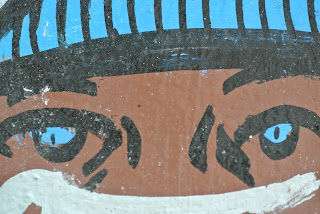A contemplative writing teacher explores the process of writing and reading memoir through reviews, discussions, links and reflections.
Tuesday, February 21, 2017
Gaze, Voice, and Audience
"Who are you writing for?" is one of the prime questions in any writing. I don't believe it is something we have to worry about too much in rough draft, but as soon as we begin revising, we need to be considering who this is for. Not just why, the deeper reason why, but to whom we are writing.
It's a hard question, though, because audience can't be too big or too small. "Everyone," is not a working answer. Too vague. "My sister," is too specific, though you can find clues in there. Why your sister? Because she, too, survived an abusive childhood? In that case, maybe you are writing to people who survived abusive childhoods. A somewhat narrow (though not narrow enough, unfortunately) audience, but getting closer. Perhaps then people who want to know what it was like, not just survivors. Ah, now we are getting there - an interest group, an audience, big enough to be diverse, small enough to have focus.
Tuesday, February 14, 2017
Listening and Hearing
 This is a wonderful writing from a student, a response to the prompt "Listening and Sounding" in last week's class. The many layers of listening and speaking, of remembering memories, and of the ways our stories about ourselves change all feel well-handled here. I appreciate her straight-forwardness mixed with wry humor. Thanks for sharing this first draft of direct writing with us, Barbara Samuel.
This is a wonderful writing from a student, a response to the prompt "Listening and Sounding" in last week's class. The many layers of listening and speaking, of remembering memories, and of the ways our stories about ourselves change all feel well-handled here. I appreciate her straight-forwardness mixed with wry humor. Thanks for sharing this first draft of direct writing with us, Barbara Samuel.I found a cassette tape that I thought I’d lost long ago. I don’t know how it found its way into the plastic storage box I pulled out of the closet in the back bedroom. I don’t even know how the storage box found its way into the corner of that closet. Or why I chose that day to dig around in the closet and investigate things that had remained in the dark for years.
When I was in my early twenties, before two-thirds of my life so far had unfolded, I was still suffering from many forms of psychic torture. I had been living in Madison and with my partner for just a few years. But I was certain that I was on the verge of becoming completely crazy, unreachable, and I attributed that to the aftereffects of a disastrous acid trip I’dexperienced at college several years before. My shrink, on whom I became completely dependent, suggested I tell him about that night, step by step, leaving out no detail. He said he would record it. By telling the story, he said, it would lose some of its power over me, and I would have the tape to play back for myself if I ever needed confirmation that I was okay.
My narrative took up most of the sixty-minute tape. I don’t remember ever playing the tape back, listening to what I said. I kept it in my top dresser drawer for years, until it was no longer there. I searched for it a few times and then forgot about it. When I found the cassette in the box in the closet, I didn’t know what it was. Written on the outside in someone else’s handwriting were the letters SAM in capitals. I couldn’t think of anything besides the Rafi song compilations we made when my son was a baby.
When I finished rummaging in the box – an unexpectedgoldmine of memorabilia – I took the tape downstairs to the kitchen where I still have a combination radio, CD and tape player, now lightly blanketed in kitchen grease. I put the tape in but it was backwards. I put it in again, correctly, and I suddenly heard my voice; then nothing but scratchy sounds from the machine. I pressed stop, opened the little door and discovered a length of tape caught in the mechanism and becoming crinkly. In a controlled panic, I gently disengaged the tape and found a pencil with an eraser. Five minutes later, the tape was flattened out and rewound. I tried again. This time it played.
As late afternoon became evening, I stood in my kitchen listening to my twenty-five-year-old self, telling her shrink about the drug experience she suspected might have ruined her life. It was pretty boring. I was disappointed. There were long pauses. Sometimes I laughed at my young self as I listened. “You said this wouldn’t make me go crazy. How do you know? Are you sure I won’t go crazy?” “No; I really don’t believe you’ll go crazy.” My shrink’s voice. What a pair we must have been, he with his thick New York accent, I with my incessant need for reassurance. At times, I wanted to say to my young voice, hurry up; get to the good part. But there was no good part. My memory had created a much more vivid story than my narrative on tape revealed. In the now dark kitchen, the dogs clamored for their dinner.
